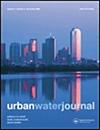基于gis增强自编码器的配水管网泄漏定位
IF 1.6
3区 环境科学与生态学
Q3 WATER RESOURCES
引用次数: 0
摘要
摘要:由于配水管网持续泄漏造成的水损失仍然是世界各地的一个实质性问题,尤其是考虑到全球缺水日益严重的明显趋势。在本文中,我们提出了一种数据驱动的泄漏定位方法,利用连接的地理信息系统和自动编码器对时变传感器数据进行异常检测。数据驱动的方法能够规避与基于模型的方法相关的许多不确定性问题,但它们通常需要大量高质量的数据,反映出许多不同的泄漏场景,才能发挥良好的性能。我们的方法通过在模型训练期间仅依赖于无泄漏数据来避免这一要求。我们在现场进行的19个真实泄漏实验中检验了这种方法的有效性。基于这些评估,我们能够实现平均搜索成本低至2.2公里,网络总长度为215公里。本文章由计算机程序翻译,如有差异,请以英文原文为准。
Leak localization in water distribution networks using GIS-Enhanced autoencoders
ABSTRACT Water loss due to persistent leakages in water distribution networks remains a substantive problem around the world, all the more so given noticeable trends of increasing global water scarcities. In this paper, we present a data-driven leak localization approach leveraging a connected Geographical Information System together with an autoencoder to perform anomaly detection on time-variable sensor data. Data-driven approaches are able to circumvent many of the uncertainty issues associated with model-based approaches, but they usually require significant amounts of high-quality data, reflecting many different leak scenarios, to perform well. Our approach obviates this requirement by relying only on leakless data during model training. We examine the efficacy of this approach on 19 realistic leak experiments conducted in the field. Based on these evaluations, we were able to achieve average search costs as low as 2.2 kilometers, for a total network length of 215 kilometers.
求助全文
通过发布文献求助,成功后即可免费获取论文全文。
去求助
来源期刊

Urban Water Journal
WATER RESOURCES-
CiteScore
4.40
自引率
11.10%
发文量
101
审稿时长
3 months
期刊介绍:
Urban Water Journal provides a forum for the research and professional communities dealing with water systems in the urban environment, directly contributing to the furtherance of sustainable development. Particular emphasis is placed on the analysis of interrelationships and interactions between the individual water systems, urban water bodies and the wider environment. The Journal encourages the adoption of an integrated approach, and system''s thinking to solve the numerous problems associated with sustainable urban water management.
Urban Water Journal focuses on the water-related infrastructure in the city: namely potable water supply, treatment and distribution; wastewater collection, treatment and management, and environmental return; storm drainage and urban flood management. Specific topics of interest include:
network design, optimisation, management, operation and rehabilitation;
novel treatment processes for water and wastewater, resource recovery, treatment plant design and optimisation as well as treatment plants as part of the integrated urban water system;
demand management and water efficiency, water recycling and source control;
stormwater management, urban flood risk quantification and management;
monitoring, utilisation and management of urban water bodies including groundwater;
water-sensitive planning and design (including analysis of interactions of the urban water cycle with city planning and green infrastructure);
resilience of the urban water system, long term scenarios to manage uncertainty, system stress testing;
data needs, smart metering and sensors, advanced data analytics for knowledge discovery, quantification and management of uncertainty, smart technologies for urban water systems;
decision-support and informatic tools;...
 求助内容:
求助内容: 应助结果提醒方式:
应助结果提醒方式:


